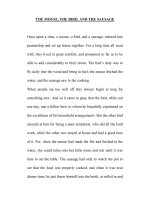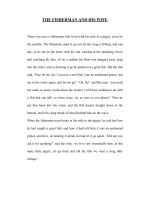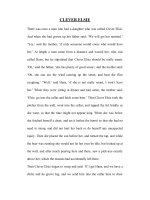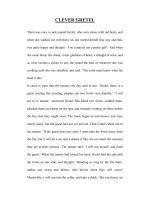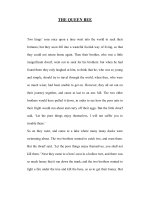korean folk tales
Bạn đang xem bản rút gọn của tài liệu. Xem và tải ngay bản đầy đủ của tài liệu tại đây (13.8 MB, 256 trang )
KOREAN IMPS
GHOSTS
AND FAIRIESKOREAN FOLK
TALES
IMPS,
GHOSTS
AND FAIRIES
TRANSLATED FROM
THE KOREAN
OF
IM BANG
AND
YI RYUK
BY
JAMES
S.
GALE
LONDON :
J.
M.
DENT
&
SONS,
LTD.
NEW YORK
:
E. P.
DUTTON &
CO.
1913
Ah
rights
reserved
TO
MY
LITTLE
SON
GEORGE
JAMES
MORLEY
THE
DAYS
OF
WHOSE
YEARS
ARE
TWO
EASTERN
SPRINGS AND
AUTUMNS
To
any
one who would like
to
look somewhat into
the
inner soul of the
Oriental,
and
see the
peculiar
spiritual
existences
among
which he
lives,
the
following
stories will
serve as
true
interpreters,
born
as
they
are of
the
three
great religions
of
the
Far
East, Taoism,
Buddhism and
Confucianism.
An
old
manuscript
copy
of
Im
Bang's
stories
came into the
hands of
the translator a
year
ago,
and
he
gives
them now
to the
Western world
that
they may
serve as
introductory essays
to
the
mysteries,
and,
what
many
call,
absurdities of
Asia.
Very
gruesome
indeed,
and
unlovely,
some
of
them
are,
but
they
picture
faithfully
the
condi-
tions
under
which
Im
Bang
himself,
and
many
past
generations
of
Koreans,
have lived.
The thirteen
short stories
by
Yi
Ryuk
are
taken
from
a
reprint
of
old Korean
writings
issued
last
year (1911),
by
a
Japanese publishing
company.
Three
anonymous
stories are also
added,
"
The Geo-
mancer,"
to
show
how Mother
Earth
has
given
anxiety
to her
chicks of children
;
"
Im,
the
viii
PREFACE
Hunter,"
to tell of the
actualities that
exist
in
the
upper
air
;
and
"
The
Man who
lost his
Legs,"
as
a
sample
of Korea's Sinbad.
The
biographical
notes
that
accompany
the
stories
are taken
very largely
from the
Kuk-cho
In-mul-chi,
"Korea's
Record of
Famous
Men."
J.
S.
GALE.
CONTENTS
I
CHARAN
I
II
THE
STORY OF CHANG TO-RYONG . .
1 8
III A
STORY OF
THE
FOX
26
IV
CHEUNG
PUK-CHANG,
THE SEER . .
.29
V
YUN
SE-PYONG,
THE WIZARD
36
VI THE
WILD-CAT WOMAN .
.
.
.41
VII
THE
ILL-FATED
PRIEST . .
.
-44
VIII
THE
VISION
OF THE
HOLY
MAN
47
IX THE
VISIT OF
THE
MAN
OF
GOD.
. .
52
X
THE LITERARY
MAN OF IMSIL .
54
XI
THE SOLDIER OF
KANG-WHA
58
XII
CURSED
BY
THE
SNAKE 60
XIII THE MAN
ON
THE
ROAD
63
XIV THE
OLD
MAN WHO BECAME A FISH . .
66
XV THE
GEOMANCER
69
XVI THE
MAN
WHO BECAME
A
PIG
.
.
73
XVII
THE OLD WOMAN WHO
BECAME
A
GOBLIN
.
78
XVIII THE GRATEFUL GHOST
80
XIX
THE
PLUCKY
MAIDEN . .
.
.
.83
XX
THE
RESOURCEFUL
WIFE
.
.
.90
XXI THE
BOXED-UP
GOVERNOR
92
XXII
THE
MAN
WHO LOST
HIS
LEGS
.
.
. IOO
XXIII TEN
THOUSAND DEVILS
104
XXIV THE HOME
OF
THE FAIRIES . . .Ill
XXV
THE HONEST WITCH
12$
ix
CONTENTS
XXVI WHOM
THE KING HONOURS
XXVII THE
FORTUNES
OF
YOO
XXV11I
AN
ENCOUNTER
WITH
A
HOBGOBLIN
xxix
THE
SNAKE'S
REVENGE
XXX THE
BRAVE MAGISTRATE
.
XXXI
THE TEMPLE
TO
THE GOD OF
WAR
XXXII
A VISIT
FROM THE
SHADES
XXXIII THE FEARLESS
CAPTAIN
XXXIV
THE KING OF YOM-NA
(HELL)
.
xxxv HONG'S EXPERIENCES
IN
HADES
XXXVI HAUNTED HOUSES
XXXVII
1M,
THE
HUNTER
XXXVIII THE
MAGIC INVASION OF
SEOUL
XXXIX THE
AWFUL
LITTLE
GOBLIN
XL GOD'S WAY
XLI THE OLD
MAN IN THE
DREAM .
XLII THE
PERFECT
PRIEST
XLIII
THE PROPITIOUS
MAGPIE
.
XLIV THE
'OLD
BUDDHA'
.
XLV A
WONDERFUL
MEDICINE
.
XLVI
FAITHFUL MO
.
XLVII
THE
RENOWNED
MAING
XLVI1I THE
SENSES
XLIX
WHO
DECIDES,
GOD OR
THE
KING?
L
THREE THINGS MASTERED
LI
STRANGELY
STRICKEN
DEAD
LII
THE
MYSTERIOUS
HOI TREE
LIU TA-HONG
.
2IO
211
213
2'5
21
7
219
BIOGRAPHICAL
IM BANG
was
born
in
1640,
the
son of a
provincial governor.
He was
very bright
as
a
boy
and from
earliest
years
fond of
study, becoming
a
great
scholar. He matriculated first
in
his
class
in
1660,
and
graduated
in
1663.
He was a
disciple
of
Song
Si-yol,
one of Korea's first writers. In
1719,
when
he
was
in
his
eightieth year,
he
became
governor
of
Seoul,
and
held
as well the office of
secretary
of the
Cabinet.
In
the
year
1721
he
got
into
difficulties over
the
choice of
the Heir
Apparent,
and
in
1722,
on account
of
a
part
he
played
in
a
disturbance
in
the
government,
he was exiled to North
Korea,
where he died.
(From
Kuk-cho
In-mul-chi,
"
Korea's Record of
Famous
Men.")
Yl
RYUK
lived in the
reign
of
King
Se-jo,
matriculated in
1459,
and
graduated
first in his class in
1564.
He was a man
of
many
offices and
many
distinctions
in
the
way
of
literary
excellence.
"
Korea's Record of Famous
Men."
XI
IMPS,
GHOSTS AND
FAIRIES
i
CHARAN
[SOME
think that
love,
strong,
true,
and self-
sacrificing,
is not to
be found
in the
Orient;
but
the
story
of
Charan,
which
comes down four hundred
years
and
more,
proves
the
contrary,
for
it still has
the
fresh,
sweet flavour of a
romance
of
yesterday
;
albeit
the
setting
of the
East
provides
an odd and
interesting background.]
In
the
days
of
King Sung-jong (A.D.
1488-1495)
one of
Korea's noted
men
became
governor
of
Pyong-an
Province. Now
Pyong-an
stands
first
of all the
eight
provinces
in the
attainments
of
erudition
and
polite society. Many
of her
literati
are
good
musicians,
and show
ability
in the affairs
of
State.
B
2
KOREAN
IMPS,
GHOSTS
AND
FAIRIES
At
the time
of
this
story
there was
a famous
dancing-girl
in
Pyong-an
whose
name was
Charan. She was
very
beautiful,
and
sang
and
danced to the
delight
of all beholders. Her
ability,
too,
was
specially
marked,
for she understood the
classics and
was
acquainted
with
history.
The
brightest
of
all the
geisha
was
she,
famous
and
far-renowned.
The
Governor's
family
consisted
of
a
son,
whose
age
was
sixteen,
and whose face was
comely
as
a
picture.
Though
so
young,
he was
thoroughly
grounded
in
Chinese,
and was a
gifted
scholar. His
judgment
was
excellent,
and
he
had
a fine
apprecia-
tion
of
literary
form,
so that
the
moment he lifted
his
pen
the written
line
took
on admirable
expres-
sion. His name became
known
as
Keydong
(The
Gifted
Lad).
The Governor
had no
other
children,
neither son
nor
daughter,
so
his
heart was
wrapped
up
in
this
boy.
On his
birthday
he
had all the
officials
invited
and other
special
guests,
who came
to drink his health.
There were
present
also a
company
of
dancing-girls
and a
large
band of
musicians. The
Governor,
during
a
lull in
the ban-
quet,
called his son to
him,
and
ordered
the
chief of
the
dancing-girls
to choose one of
the
prettiest
of
their
number,
that
he
and
she
might
dance
together
and
delight
the
assembled
guests.
On
hearing
this,
the
company,
with one
accord,
called for
Charan,
CHARAN
3
as the one suited
by
her
talents,
attainments
and
age
to be a
fitting
partner
for his
son.
They
came
out
and
danced
like
fairies,
graceful
as
the
wavings
of
the
willow,
light
and
airy
as the swallow.
All
who saw
them were
charmed. The
Governor, too,
greatly
pleased,
called
Charan to
him,
had her
sit on
the
dais,
treated
her
to a share
in
the
banquet,
gave
her a
present
of
silk,
and
commanded
that from
that
day
forth she be the
special dancing
maiden
to
attend
upon
his
son.
From this
birthday
forth
they
became
fast friends
together.
They
thought
the world of
each other.
More than all
the
delightful
stories
of
history
was
their
love
such as had never been seen.
The
Governor's term
of
office
was
extended for
six
years
more,
and so
they
remained in the north
country. Finally,
at
the time
of
return,
he
and his
wife were
in
great
anxiety
over
their
son
being
separated
from
Charan. If
they
were to force
them
to
separate,
they
feared he
would die of a
broken
heart.
If
they
took her with
them,
she not
being
his
wife,
they
feared for his
reputation.
They
could
not
possibly
decide,
so
they
concluded to refer the
matter
to
the
son
himself.
They
called him
and
said,
"Even
parents
cannot decide as to the
love
of
their son
for a
maiden.
What
ought
we to do?
You love
Charan so that it will
be
very
hard
for
you
to
part,
and
yet
to have
a
dancing-girl
before
4
KOREAN
IMPS,
GHOSTS AND FAIRIES
you
are married
is
not
good
form,
and will interfere
with
your
marriage
prospects
and
promotion.
However,
the
having
of a second wife
is a common
custom
in
Korea,
and one that
the world
recognizes.
Do
as
you
think
best
in the
matter." The
son
replied,
"There
is
no
difficulty;
when she is
before
my eyes,
of course
she is
everything,
but
when
the
time comes
for me to start for home
she
will
be like a
pair
of worn
shoes,
set
aside
;
so
please
do
not be
anxious."
The
Governor
and
his wife were
greatly
delighted,
and said
he was
a
"superior
man
"
indeed.
When
the time
came to
part
Charan
cried
bitterly,
so that
those
standing
by
could not bear to
look
at
her;
but
the son showed
not the
slightest
sign
of emotion. Those
looking
on
were
filled
with
wonder at his fortitude.
Although
he had
already
loved
Charan
for six
years,
he had never
been
separated
from her for a
single day,
so
he knew not
what it
meant to
say Good-bye,
nor
did he know
how it felt to
be
parted.
The
Governor returned to Seoul to fill
the office
of Chief
Justice,
and
the
son
came also.
After
this
return
thoughts
of love
for Charan
possessed
Keydong, though
he
never
expressed
them
in
word
or manner.
It
was
almost the time
of
the Kam-see
Examination. The
father,
therefore,
ordered
his
son
to
go
with
some
of
his
friends
to
a
neighbour-
CHARAN
5
ing
monastery
to
study
and
prepare. They
went,
and
one
night,
after the
day's
work
was
over and
all were
asleep,
the
young
man stole
out
into the
courtyard.
It
was
winter,
with frost and snow and
a
cold,
clear
moon. The mountains
were
deep
and
the world
was
quiet,
so
that
the
slightest
sound
could be heard.
The
young
man looked
up
at the
moon
and his
thoughts
were full
of
sorrow.
He
so
wished
to
see
Charan
that he could no
longer
control
himself,
and
fearing
that he would
lose his
reason,
he decided
that
very night
to set
out
for far-
distant
Pyong-an.
He
had on a fur
head-dress,
a
thick
coat,
a leather belt and
a
heavy pair
of
shoes. When he had
gone
less than ten
lee,
how-
ever,
his
feet
were
blistered,
and he
had to
go
into
a
neighbouring village
and
change
his
leather
shoes
for
straw
sandals,
and
his
expensive
head-cover for
an
ordinary
servant's hat. He went thus on his
way,
begging
as
he
went.
He was often
very
hungry,
and
when
night
came,
was
very,
very
cold.
He was a
rich
man's
son and
had
always
dressed
in silk and
eaten
dainty
fare,
and
had
never in
his
life walked more
than a few
feet
from
his father's
door. Now
there
lay
before him
a
journey
of
hundreds of miles.
He
went
stumbling
along
through
the
snow,
making
but
poor
progress.
Hungry,
and
frozen
nearly
to
death,
he had
never
known
such
suffering
before. His
clothes were
6
KOREAN
IMPS,
GHOSTS
AND
FAIRIES
torn
and his face
became
worn
down and blackened
till
he
looked like
a
goblin.
Still on he
went,
little
by
little,
day
after
day,
till at
last,
when
a
whole
month had
gone
by,
he
reached
Pyong-an.
Straight
to
Charan's
home he
went,
but Charan
was
not
there,
only
her
mother. She looked
at
him,
but did not
recognize
him. He said he
was
the former Governor's son
and that
out of love for
Charan he had walked
five
hundred
lee.
"Where
is she?"
he asked. The mother
heard,
but instead
of
being
pleased
was
very angry.
She
said,
"My
daughter
is now
with the son
of
the
new
Governor,
and
I never
see
her
at
all
;
she
never
comes
home,
and
she has
been
away
for two
or three
months.
Even
though you
have made this
long
journey
there
is
no
possible
way
to meet her."
She did
not
invite
him
in,
so cold was her
wel-
come.
He
thought
to
himself,
"I
came to
see
Charan,
but she is not here. Her
mother
refuses
me;
I
cannot
go
back,
and I
cannot
stay.
What
shall
I
do
?
"
While
thus
in
this dilemma a
plan
occurred to
him.
There was a
scribe in
Pyong-
an,
who,
during
his father's term of
office,
had
offended,
and
was sentenced
to
death.
There were
extenuating
circumstances,
however,
and
he,
when
he went
to
pay
his
morning
salutations,
had
be-
sought
and
secured his
pardon.
His
father,
out
of
regard
for his
son's
petition,
had
forgiven
the
CHARAN
7
scribe.
He
thought,
"I
was
the
means of
saving
the
man's
life,
he will take
me
in;"
so
he went
straight
from
Charan's
to the
house of the
scribe.
But
at first this
writer did
not
recognize
him.
When he
gave
his name
and
told
who he
was,
the
scribe
gave
a
great
start,
and fell
at
his feet
making
obeisance.
He cleared out
an inner
room and made
him
comfortable,
prepared dainty
fare and
treated
him
with
all
respect.
A little
later
he
talked over
with
his
host the
possibility
of his
meeting
Charan. The scribe
said,
"
I
am afraid that there is no
way
for
you
to
meet
her
alone,
but
if
you
would like to
see even
her
face,
I
think
I
can
manage
it. Will
you
consent
?
"
He asked
as
to the
plan.
It
was this
:
It
being
now a
time
of
snow,
daily
coolies
were called to
sweep
it
away
from
the
inner court
of
the
Gover-
nor's
yamen,
and
just
now
the
scribe was
in
charge
of this
particular
work. Said
he,
"If
you
will
join
the
sweepers,
take
a
broom and
go
in
;
you
will
no
doubt
catch
a
glimpse
of Charan as she
is said to
be
in
the
Hill
Kiosk.
I
know
of no
other
plan."
Keydong
consented.
In
the
early
morning
he
mixed
with
the
company
of
sweepers
and went with
his
broom
into
the
inner
enclosure,
where
the
Hill
Kiosk
was,
and
so
they
worked at
sweeping.
Just
then the
Governor's son was
sitting by
the
open
window and
Charan was
by
him,
but
not visible
8 KOREAN
IMPS,
GHOSTS
AND
FAIRIES
from the outside.
The
other
workers,
being
all
practised
hands,
swept
well
;
Keydong
alone
handled
his broom
to no
advantage,
knowing
not
how to
sweep.
The Governor's
son,
watching
the
process,
looked
out
and
laughed,
called
Charan and invited
her to
see
this
sweeper.
Charan
stepped
out into
the
open
hall
and
the
sweeper
raised
his
eyes
to
see. She
glanced
at him but
once,
and but
for a
moment,
then turned
quickly,
went into the
room,
and shut
the
door,
not
appearing again,
to the
disappointment
of the
sweeper,
who came
back irr
despair
to
the
scribe's
house.
Charan was first of
all a
wise and
highly
gifted
woman.
One
look had told
her
who
the
sweeper
was.
She came back into the room and
began
to
cry.
The
Governor's
son looked
in
surprise
and
displeasure,
and
asked,
"
Why
do
you cry
?
"
She
did
not
reply
at
once,
but
after
two or
three
insistent
demands told
the
reason thus
:
"
I
am a low
class
woman
;
you
are mistaken in
thinking
highly
of
me,
or
counting
me
of
worth.
Already
I
have not
been
home for
two whole
months
and
more.
This
is
a
special
compliment
and
a
high
honour,
and so
there
is
not the
slightest
reason for
any complaint
on
my
part.
But
still,
I think
of
my
home,
which is
poor,
and
my
mother.
It is
customary
on the
anniversary
of
my
father's
death to
prepare
food
from
the
official
quarters,
and
offer a
sacrifice
to
his
spirit,
CHARAN
9
but here
I
am
imprisoned
and to-morrow is the
sacrificial
day.
I
fear
that not a
single
act of
devotion
will
be
paid,
I
am disturbed over
it,
and
that's
why
I
cry."
The
Governor's
son was so
taken in
by
this
fair
statement
that he
trusted her
fully
and without
a
question.
Sympathetically
he
asked,
"Why
didn't
you
tell me
before
?
"
He
prepared
the food
and
told her to
hurry
home and
carry
out the
ceremony.
So Charan
came like
flaming
fire
back to her
house,
and said to her
mother,
"
Keydong
has come
and 1
have
seen him. Is he not here?
Tell me where
he
is
if
you
know."
The
mother
said,
"He
came
here,
it is
true,
all
the
way
on foot to see
you,
but
I
told
him that
you
were
in the
yamen
and that
there was
no
possible
way
for
you
to
meet,
so he
went
away
and
where he is
I
know
not."
Then
Charan
broke down and
began
to
cry.
"Oh,
my
mother,
why
had
you
the heart to do so
cruelly?
"
she sobbed. "As
far as I
am concerned
I
can
never break
with
him nor
give
him
up.
We
were
each sixteen when chosen
to
dance
together,
and
while it
may
be said
that men
chose
us,
it is
truer still to
say
that God hath chosen. We
grew
into each other's
lives,
and there was never such
love
as ours.
Though
he
forgot
and
left
me,
I
can
never
forget
and
can never
give
him
up.
The
Governor, too,
called me
the
beloved wife
of
his



